Mohr Siebeck Perspectives on Paul, Judaism, and the Law (15 vols.)
Digital Logos Edition
Overview
This collection of contemporary academic studies provides unique insights into Paul’s thought and theology. Important Pauline scholars like James D.G. Dunn, Heikki Räisänen, Seyoon Kim, and C. Marvin Pate deal in-depth with Paul’s key passages, influences, as well as his views on Judaism and the Law. The books in this collection are indispensable for serious research into Pauline literature.
Key Features
- Features volumes written or edited by respected New Testament scholars
- Presents various contemporary views on Paul’s thought and theology regarding Judaism and the Law
- Sheds light on some of the key influences and most discussed passages of Paul’s work
Product Details
- Title: Mohr Siebeck Perspectives on Paul, Judaism and the Law (15 vols.)
- Publisher: Mohr Siebeck
- Volumes: 15
- Pages: 5,134
- Resource Type: Monographs
- Topic: Pauline Studies
Individual Titles
- The Irrevocable Call of God: An Inquiry into Paul’s Theology of Israel by Richard H. Bell
- Mission-Commitment in Ancient Judaism and in the Pauline Communities: The Shape, Extent and Background of Early Christian Mission by John Dickson
- The Origin of Paul’s Gospel by Seyoon Kim
- The Origins of Pauline Pneumatology: The Eschatological Bestowal of the Spirit upon Gentiles in Judaism and in the Early Development of Paul’s Theology by Finny Philip
- Paul and the Mosaic Law: The Third Durham-Tübingen Research Symposium on Earliest Christianity and Judaism edited by James D.G. Dunn
- Paul’s Anthropology in Context: The Image of God, Assimilation to God, and Tripartite Man in Ancient Judaism, Ancient Philosophy and Early Christianity by George H. van Kooten
- The Reverse of the Curse: Paul, Wisdom, and the Law by C. Marvin Pate
- Paul and the Early Jewish Encounter with Deuteronomy by David Lincicum
- Pistis and the Righteous One: A Study of Romans 1:17 against the Background of Scripture and Second Temple Jewish Literature by Desta Heliso
- The Spirit and the Restoration of Israel: New Exodus and New Creation Motifs in Galatians by Rodrigo J. Morales
- Paul and the New Perspective: Second Thoughts on the Origin of Paul’s Gospel by Seyoon Kim
- Derhetorizing Paul: A Dynamic Perspective on Pauline Theology and the Law by Lauri Thurén
- The Death of the Soul in Romans 7: Sin, Death, and the Law in Light of Hellenistic Moral Psychology by Emma Wasserman
- Paul and the Law by Heikki Räisänen
- Inconsistency in Paul?: A Critique of the Work of Heikki Räisänen by T.E. van Spanje
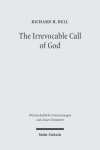
Richard Bell examines the impact of Paul’s life changing experience before Damascus on his theological understanding of Israel. The book considers the development of Paul’s view concerning the election and salvation of Israel, paying special attention to 1 Thessalonians, Galatians and Romans. The author examines Paul’s critique of Israel’s religion in the light of traditional protestant approaches and the ‘new perspective.’ The work concludes by considering some contemporary issues relating to Israel in the light of Paul’s theology.
Richard H. Bell is a reader in theology at the University of Nottingham in the United Kingdom.
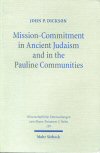
The extent to which Jewish and Christian communities of the first century evidenced ‘proselytising’ tendencies has been hotly contested in recent research, with scholars tending either to deny outright or affirm emphatically the presence of ‘mission’ in the synagogue or the church. Through a thorough historical and philological examination of Second Temple Jewish literature and the epistles of Paul, John P. Dickson offers a carefully nuanced picture of the shape and extent of mission-commitment in Judaism and early Christianity. Particularly significant is the author’s contention that the mission outlook of the apostle Paul—both in his self-conception and in his expectations of converts—was shaped decisively by his Jewish heritage.
John Dickson is currently honorary associate and research assistant within the Department of Ancient History at Macquarie University in Sydney. He is also a minister for an Anglican church in Sydney.
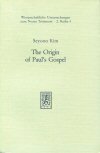
In answer to Pauline scholarship that tends to explain the origin of Paul’s gospel in Palestinian Judaism, Hellenistic Judaism, mystery cults, or Gnosticism, Seyoon Kim here argues that the origin lies in Paul’s own testimony that he received the gospel from the revelation of Jesus Christ on the Damascus road. “Only when this insistence of Paul is taken seriously,” says Kim, “can we really understand Paul and his theology.”
Kim begins his investigation of Paul’s interpretation of the Damascus event by examining Paul’s Rabbinic background. He then takes a more detailed look at just what occurred on the Damascus road, and follows this with a thorough discussion of Paul’s gospel--the revelation, its Christology, and its soteriology--keeping in mind at all times how it relates to the Damascus event.
Seyoon Kim has been professor of New Testament at Fuller Theological Seminary, Pasadena, California since 1995.
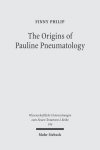
Finny Philip inquires into Paul’s initial thoughts on the Holy Spirit. Paul’s conviction that he was called to be an apostle to the gentiles and that God bestowed the Spirit upon the gentiles apart from Torah obedience is the basis for any inquiry on this subject. Central to Philip’s argument is Paul’s conviction that God graciously endowed his Gentile converts with the gift of the Spirit, an understanding that is rooted primarily in his conversion experience and secondarily in his experience with and as a missionary of the Hellenistic community in Antioch. In examining the range of expectations of the Spirit that were present in both Hebrew scripture and in the wider Jewish literature, the author comes to the conclusion that such a concept is rare, and that it is usually the covenant community to which the promise of the Spirit is given. Furthermore, Paul’s own pre-Christian convictions about the Spirit, a result of his own self-perception as a Pharisee and persecutor of the church, display continuity between his thought patterns and those of Second Temple Judaism. Paul’s Damascus experience was an experience of the Spirit. His experience of the “glory of God in the face of Jesus Christ” (2 Cor. 3:1–4:6) provided him with the belief that there was now a new relationship with God, which was possible through the sphere of the Spirit. In addition, Paul was influenced by the Hellenists, whose theological beliefs included the perception of the church as the eschatological temple in which the Spirit of God is the manifest presence of God. It is in these notions that one may trace the origins of Paul’s thoughts on the Holy Spirit.
Finny Philip is working as the academic dean for Filadelfia Bible College in Udaipur, India and a visiting faculty to a Serampore affiliated college.
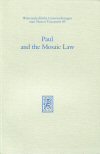
A thorough and integrated study of the key passages in Paul dealing with the Jewish law, which brings together a representative range of the divergent views currently maintained within this contentous subject. This conference volume attempts to point the way forward to possible ways of consensus.
James D.G. Dunn is emeritus Lightfoot Professor of Divinity at the University of Durham and is a leading British New Testament scholar.
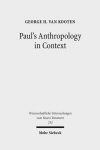
George H. van Kooten offers a radical contextualization of Paul’s view of man within the Graeco-Roman discourse of his day. On the one hand, important anthropological terminology such as “image of God” and “spirit” derives from the Jewish creation accounts of Genesis 1–2. On the other hand, this terminology appears to be compatible with reflections of Graeco-Roman philosophers on man as the image of God and on man’s mind, and is supplemented with Platonic concepts such as “the inner man.” For this reason, the author traces the development of Paul’s anthropology against the background of both ancient Judaism and ancient philosophy. Although he takes his starting point from Jewish texts, and is not out of tune with particular Jewish thoughts about the close relation between man and God, Paul, like Philo of Alexandria, seems to owe a lot to contemporary philosophical anthropology. Paul’s view, for instance, that man needs to be “transformed into the image of God” lacks Jewish antecedents, but reflects the pagan philosophical notion of man’s assimilation to God. George H. van Kooten emphasizes that it is no longer possible to deny the relevance of a Greek context for Paul’s view of man, and argues that Paul should be understood in the wake of the first century BC introduction of a comprehensive Platonic doctrine of man’s assimilation to God through virtue. Paul’s anthropology, which calls for inner transformation and is universally applicable, criticizes the superficial values of the sophistic movement in Corinth and the anthropomorphic images of the gods, and offers a strategy to overcome the ethnic tensions which divide the Christian community in Rome.
George H. van Kooten, is the director of the Research Institute for Culture, Religion and Society – Interdisciplinary Studies (CRASIS) in Graeco-Roman Antiquity at the University of Groningen, and dean of the faculty of theology & religious studies.
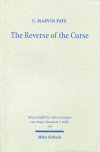
C. Marvin Pate examines the undisputed Pauline writings and demonstrates that wherever Paul employs the theme of wisdom, he does so to reverse the Deuteronomic curses and blessings. The covenantal blessings rest on those whose faith is in Christ, the wisdom of God, while the covenantal curses abide on those who attempt to obey the Torah. All of this results from Paul’s separation of Christ, God’s wisdom, from the law of Moses.
In addition, the author deals with two secondary themes. First of all, he calls the ‘new perspective’ on Paul into question. Secondly, a revised form of the ‘Tübingen theory’ is put forth. Both of these points call scholarship back to a more Lutheran reading of the subject of Pauline theology, emphasizing the importance of law and gospel therein.
Contents:
- Introduction: The Current State of Research. A Survey
- Forschungsbericht – The Procedure of This Study
- I. Wisdom, Law, and the Deuteronomistic. Tradition: Theocratic Interpretations
- II. Wisdom and Law in Diaspora Judaism. Apologetic Interpretations
- III. Wisdom and Law in Jewish Apocalypticism
- IV. Apocalyptic, Sectarian Interpretations of Wisdom and Law. 1 Enoch and the Dead Sea Scrolls
- V. Wisdom and Law according to the Pre-Christian Paul. A Theoretic Interpretation
- VI. The Apostle Paul’s Disassociation of Wisdom and Law in Galatians. An Apocalyptic, Sectarian Interpretation
- VII. The Reverse of the Curse. Wisdom Versus Law in Other Pauline Letters
- VIII. Christian Apocalyptic Interpretations of Wisdom and Law. The Judaizers and Matthew
- IX. Christian Apologetic Interpretations of Wisdom and Law. Luke-Acts and James
C. Marvin Pate teaches at Ouachita Baptist University in Arkadelphia, Arkansas. He was previously professor of Bible at Moody Bible Institute in Chicago, Illinois.
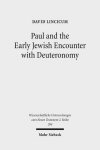
Attending to the realia of ancient practices for reading scripture, David Lincicum charts the effective history of Deuteronomy in a broad range of early Jewish authors in antiquity. By viewing Paul as one example of this long history of tradition, the apostle emerges as a Jewish reader of Deuteronomy. In light of his transformation by encounter with the risen Christ, Paul’s interpretation of the end of the Pentateuch alternates between the traditional and the radical, but remains in conversation with his Jewish rough contemporaries. Specifically, Paul is seen to interpret Deuteronomy with a threefold construal as ethical authority, theological norm, and a lens for the interpretation of Israel’s history. In this way, the volume sets Paul firmly in the history of Jewish biblical interpretation and at the same time provides a wide-ranging survey of the impact of Deuteronomy in antiquity.
David Lincicum is associate professor in biblical studies and Christianity and Judaism in antiquity in the department of theology at the University of Notre Dame.
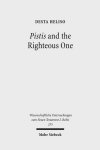
Many regard Romans 1:17, which contains Paul’s own declarative statement and its scriptural proof from Habakkuk 2:4, as the thesis of Romans. How the passage is read therefore determines how the whole letter is interpreted. The traditional Lutheran understanding is that the passage introduces and provides a framework for the doctrine of justification by faith, where the ‘righteous one’ in the Habakkuk citation (Rom. 1:17b) represents a person who was ungodly but is now justified or declared righteous through his or her own faith. This understanding has been challenged by some who have offered a christological reading where the person of the citation is taken to be Christ, hence one’s justification depends chiefly on Christ’s faithfulness. The study in this book adjudicates mainly between these two interpretative categories through thorough and comprehensive exegetical considerations of internal texts and comparative analyses of scriptural and Second Temple Jewish backgrounds. The result shows the internal coherence and cogency of the christological interpretation while acknowledging the validity of the traditional-Lutheran understanding of the passage.
Desta Heliso is a lecturer at the Ethiopian Graduate School of Theology in Addis Ababa, Ethiopia.
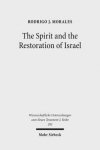
When the Apostle Paul asks the Galatians, “This alone I want to know from you: was it from works of the Law that you received the Spirit, or from the proclamation of faith?” he presumes a certain understanding of the significance of the Galatians’ spirit experience. In this book, Rodrigo J. Morales offers an examination of the themes of new exodus, new creation, and the restoration of Israel in the Old Testament prophets and in Second Temple Jewish literature. In doing so he shows that Paul interpreted the outpouring of the Spirit as the sign of the fulfilment of God’s promises to restore Israel. In addition, Paul identifies the gift of the spirit with the extension of the blessing of Abraham to the gentiles because Deutero-Isaiah bound the restoration of Israel to the blessing of Abraham, as well as to the inclusion of the gentiles.
Rodrigo J. Morales is assistant professor of theology at Marquette University in Milwaukee, Wisconsin.
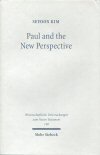
Critical studies of the two ‘test cases’ for James D.G. Dunn’s ‘New Perspective on Paul,’ Paul’s Damascus experience and Galatians 3:10–14, reaffirm the Reformation interpretation of Paul’s doctrine of justification and confirm that Paul obtained that doctrine from his Damascus experience. The discovery that Isaiah 42 influenced Paul’s interpretation of his apostolic call helps explain how Paul developed his antithesis between the Spirit and the flesh/law and why he insists on the impossibility of justification by works of the law. Contrary to the assumption of the ‘New Perspective School,’ Seyoon Kim’s studies issue a call to take Paul seriously as an important witness to his contemporary Judaism. The distinctive Pauline doctrine of Christ as the image of God and as the last Adam is revisited in the light of the growing interest in the apocalyptic-mystical background of Paul. The author also explicates how Paul uses the Jesus tradition in the light of the Damascus experience to develop his christology and soteriology. So, while reaffirming the significance of the Damascus event, Seyoon Kim now appreciates the Jesus tradition as equally important for the origin of Paul’s gospel. Thus, the overall thesis of the book is that Paul’s gospel is a child born of two parents, the Damascus revelation and the Jesus tradition.
Seyoon Kim has been professor of New Testament at Fuller Theological Seminary, Pasadena, California since 1995.
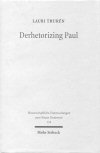
In 1 Thessalonians 1:8 Paul claims: “In every place your faith toward God has gone forth, so that we have no need to speak a word.” We can smile at a call to stop missionary activity based on that verse. Lauri Thurén argues that Paul and his original addressees would smile at us for the very same reason, were they aware of many of the problems of modern Pauline scholarship. Expressions, which were never meant to be taken at their face value, may have promoted sophisticated but erroneous theological and historical reflections. This is due not only to the scholars’ ignorance of ancient rhetorical and epistolary conventions, but also to their static attitude to the text itself.
Lauri Thurén offers a different study which is based on a natural, dynamic view of Paul’s letters. In order to describe any theology beyond the texts, they need to be derhetorized. This means an identification of the persuasive devices in Pauline texts in order to filter out their effect on the theological ideas expressed. This principle is applied to a controversial issue in Pauline theology, the question of law. Lauri Thurén claims that Paul’s exaggerated statements correspond to his hyperbolic way of thinking. His search for consistency in the Old Testament was a major reason for his revolt against the law.
Lauri Thurén is a senior research fellow at the Academy of Finland in Helsinki.
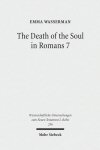
The monologue of Romans 7 has proved central to the Christian West, where interpreters such as Augustine and Martin Luther have made the text into a paradigm for the plight of mankind, torn between the demands of God’s goodness and its own sinful nature. Emma Wasserman argues that the monologue can be better contextualized within certain intellectual discourses alive in Paul’s day. In light of certain Platonic traditions about the soul, the monologue emerges as the voice of reason or mind describing its defeat at the hands of passions and desires represented as sin. Especially as developed by Philo of Alexandria, Platonic traditions of representing extreme cases of immorality account for a number of difficult features of the text. Such traditions can account for the metaphors of enslavement, imprisonment, warfare, and death; the representation of the passions as sin and the association with the body, members, and flesh; the Platonic language about mind and the speaker’s role in reasoning, reflecting, and judging; the problem of the law in the first part of the monologue (verses 7–13) and the plight of self-contradiction in the second (verses 14–25). The reading thus finds that the speaker is reason or mind, recounting its discovery that it cannot put any of its good judgments into action because of the dominance of the passions.
Emma Wasserman is assistant professor of religion at Rutgers University in New Brunswick, New Jersey.
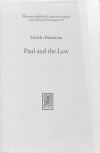
Renowned Pauline scholar Heikki Räisänen explores the tenuous relationship between the apostle Paul and the Jewish law. Exploring important texts in Paul’s epistles concerning his writings on the Law, this resource has helped to reframe the discussion on the evolution of Paul’s thought and theology.
Heikki Räisänen (1941–2015) was a Finnish doctor of theology, and was a professor of New Testament biblical studies a the University of Helsinki from 1975 to 2006.
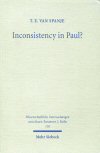
Is Paul as inconsistent in his thinking as Heikki Räisänen demonstrates? With the help of several hermeneutical techniques, T.E. van Spanje shows that the contrary is the case.
T.E. van Spanje is a New Testament professor at Theological University Apeldoorn in the Netherlands.
Reviews
1 rating

Marcin Kowalski
10/29/2017
What is going on with this excellent collection? Can anybody tell me we can expect it to become a part of the Logos?